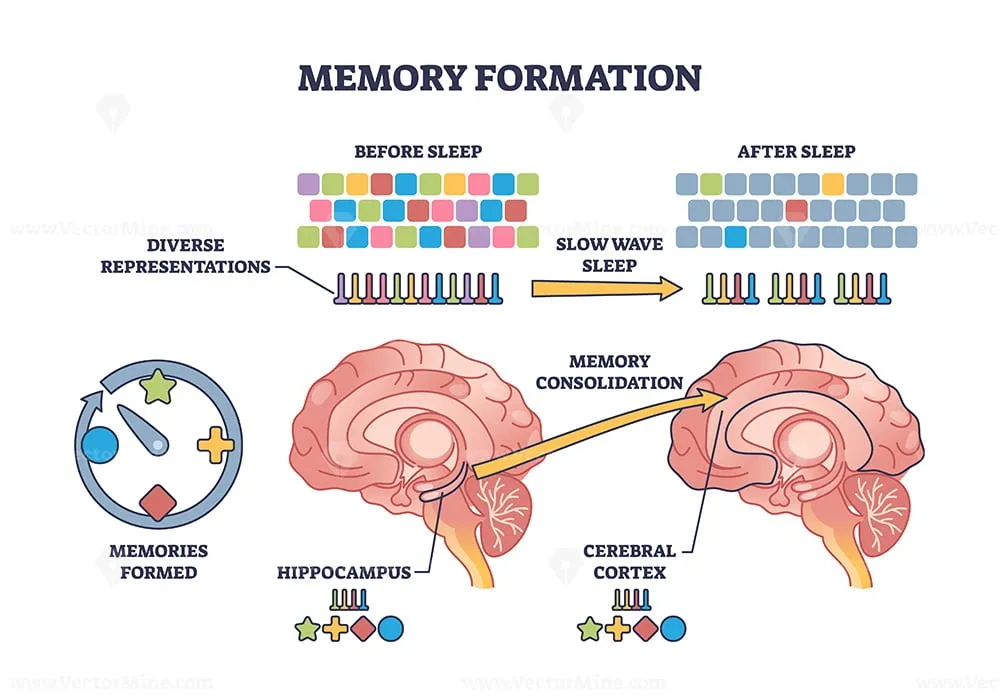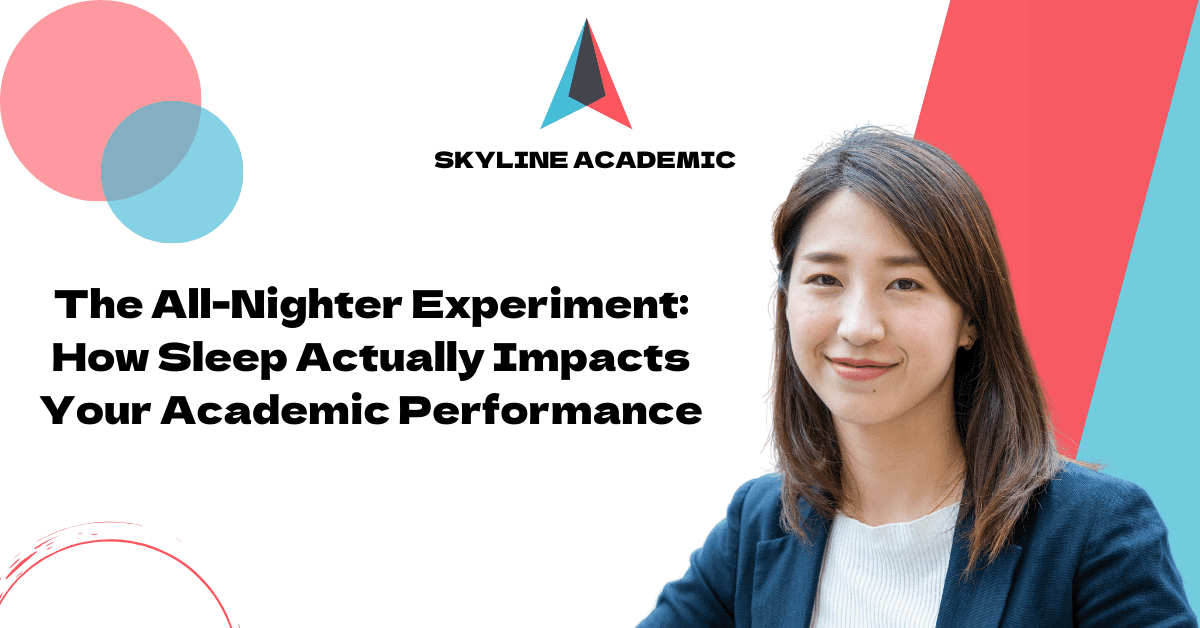The All-Nighter Experiment: How Sleep Actually Impacts Your Academic Performance
Sleep and academic performance share a stronger connection than most students might think. Students often see pulling an all-nighter as their only option before big exams, but science tells us something completely different. CDC reports show that 57.8% of middle school students and 72.7% of high school students fail to get enough sleep . These numbers raise red flags because a student’s GPA drops by 0.07 with each hour of missed sleep .
Sleep plays a crucial role in how our brains process and store information. Research shows that healthy adults need seven to nine hours of sleep . Most college students get nowhere near that amount – averaging just 6.5 hours each night . Students who don’t get enough sleep struggle to think clearly, which directly affects their grades . Research proves that well-rested students do better on memory and motor tasks compared to tired ones . Students who sleep less than six hours each night are 4.2 times more likely to catch a cold . This means missing classes and falling behind.
In this piece, you’ll learn about sleep’s effects on your academic performance. We’ll look at what happens during an all-nighter and share practical ways to improve your sleep habits as a student.
The science behind sleep and learning

Image Source: VectorMine
Your brain stays active during sleep by switching to a vital processing mode. Let’s get into the fascinating connection between sleep cycles and learning.
How memory consolidation works during sleep
Sleep acts as your brain’s information processor that moves new knowledge from temporary storage in the hippocampus to permanent memory vaults in the frontal cortex [1]. Your brain works through the night to strengthen important memories and marks less useful ones to delete [1]. This process needs specific time – research shows that for every hour you spend awake learning, your brain needs 30 minutes of sleep to process this information properly [1].
Your brain repeatedly “replays” neural patterns you experienced during the day to consolidate memories [2]. Students in one study showed how fragile these memory traces can be. Those who missed a night’s sleep struggled with task recall up to three days later [1].
Why is sleep important for students’ brain function?
Students who don’t get enough sleep face three major cognitive challenges. Sleep loss directly hurts learning and memory formation [3]. It substantially reduces attention and alertness needed to succeed in class [3]. The brain also struggles to merge new information with existing knowledge [4].
The link between sleep and academic success speaks volumes. Research consistently proves that less sleep time, irregular sleep patterns, and poor sleep quality hurt school performance from middle school through college [3]. The American Academy of Sleep Medicine highlights that students getting adequate sleep perform notably better on memory and motor tasks compared to sleep-deprived peers [3].
The role of REM and deep sleep in academic performance
REM (rapid eye movement) and deep sleep stages each contribute uniquely to academic success. We relied on REM sleep to support cognitive functions like memory, learning, and emotional processing [1]. Deep sleep (also called slow-wave sleep) helps with physical recovery, immune function, and keeps your brain healthy overall [1].
Different academic tasks need different sleep stages. Memory for cognitive procedural tasks takes a hit from lost REM sleep, especially on nights one and three after learning [5]. Stage 2 sleep, which happens mostly in early morning hours, proves vital for motor skill learning – from sports to lab work [5].
What happens when you pull an all-nighter

Image Source: Dreamstime.com
Your brain pays a heavy price when you pull an all-nighter, and these effects last well beyond your final exam. Let’s get into what science reveals about your brain during extended periods without sleep.
Immediate effects on focus and attention
Your focus takes a nosedive and mental impairment kicks in after staying awake for 24 hours [6]. Tests show your reaction time drops by up to 50% when you go without sleep [7]. Simple tasks become a real challenge as your brain struggles to stay alert after one sleepless night [8].
Sleep deprivation hits your tonic alertness, selective attention, and sustained attention hard [9]. This explains why you find yourself reading the same paragraph over and over during those late-night study sessions.
Effect on memory retention and recall
Your memory takes a serious hit when you skip sleep. Missing a full night’s rest before learning new information damages your memory with a medium effect size (g = 0.62) [10]. Even losing sleep after learning something new hurts your recall with a small effect size (g = 0.28) [10].
Scientists have found that total sleep deprivation reduces hippocampal activation during memory encoding [11]. This change in your brain explains why cramming all night rarely works – your sleep-deprived brain just can’t create strong memories.
How sleep deprivation mimics alcohol impairment
The scariest part? Staying awake for 17-19 hours impairs you as much as having a blood alcohol concentration (BAC) of 0.05% [7]. Push that to 24 hours without sleep, and you’re functioning like someone with a BAC of 0.10% [7] – legally drunk in most places.
Yes, it is fascinating that alcohol and sleep deprivation work through similar biological mechanisms by affecting adenosine receptors in the brain [12]. Taking an exam after an all-nighter is like trying to ace it while drunk.
Sleep and grades: what the data shows
Numbers tell the real story about sleep and academic performance. Research across multiple universities shows each hour of sleep you lose drops your end-of-term GPA by 0.07 [1]. Students who sleep less than 6 hours a night see their GPAs fall from 3.5 to 3.25 [1].
Sleep quality and quantity are responsible for about 25% of academic performance variations [13]. This becomes crucial especially when you have first-year college students, as poor sleep habits early in the semester lead to lower grades throughout the term [5].
Long-term consequences of sleep loss
Sleep loss doesn’t just make you tired the next day – it can seriously damage your mind and body over time. The effects are way beyond just feeling exhausted.
Mental health risks: anxiety, depression, and stress
Students who don’t get enough sleep face higher risks to their mental health. Research shows students with poor sleep have a 21% higher risk of depression [14] and are 25% more likely to develop anxiety [15]. The numbers become more concerning for teenagers. Each additional night of poor sleep makes teens 20% more likely to show signs of depression [16].
These sleep issues create a vicious cycle. Poor mental health makes it harder to sleep well, and bad sleep makes mental health worse [14]. New college students seem to struggle the most. Their sleep patterns during this major life change are strongly associated with more depression and anxiety symptoms [17].
Physical health issues: immune system and heart
Poor sleep takes a toll on physical health through several ways. Students who chronically lack sleep face immune system problems and are 200-300% more likely to develop coronary artery buildup [18]. The heart risks are startling – just one hour less sleep raises heart attack risk by 24% [18].
Sleep loss also triggers inflammation throughout the body [19], weakens the immune system’s ability to fight infections [19], and disrupts metabolism. These changes raise the risk of diabetes by 28%, obesity by 55%, and high blood pressure by 21% [19].
Sleep duration and academic performance over time
Bad sleep habits hurt grades more as time passes. Students who sleep less than 6 hours each night see their GPA drop by 0.07 points for every hour of missed sleep [1]. Students who sleep better maintain GPAs about 0.2 points higher than those who don’t [20].
Sleep’s effect on grades works differently than most people think. Your sleep patterns for the whole month before an exam substantially affect your performance – not just how well you sleep the night before [21].
How to improve your sleep habits as a student
Better sleep doesn’t need big changes. Small tweaks can make a huge difference in your academic performance.
Set a consistent sleep schedule
Your body runs on consistency, so stick to the same bedtime and wake-up time every day. The wake-up time matters even more [22]. Students perform best with 7-9 hours of sleep each night [23].
Create a wind-down routine
A 30-60 minute bedtime ritual tells your brain it’s time to sleep [24]. These activities help you relax:
- Read a book under soft lighting
- Write in a journal or plan tomorrow
- Take a warm bath (do this an hour before bed)
- Try meditation or deep breathing
Limit screen time before bed
Your devices’ blue light makes it harder to sleep by reducing melatonin [9]. Put away your screens 30-60 minutes before bed [25]. You can use Night Shift on Apple devices or Blue Light filter on Android if needed [26].
Use sleep and study apps to stay on track
Sleep apps can track your patterns and sleep quality using your phone’s movement sensor [27]. Calm is a great option that provides sleep stories and meditations to help you drift off and stay asleep [28].
Quick-win: Try the Pomodoro method to get more done
Break your work into 25-minute chunks with 5-minute breaks [29]. Take a longer break of 15-30 minutes after four sessions [30]. This method stops you from burning out and helps you stay focused [31].
Want more tips on balancing sleep and studies? Check out Skyline’s detailed resources on sleep management and study techniques.
Conclusion
Sleep plays a key role in academic success. Most students don’t realize how much it matters. This piece shows how lack of sleep affects the cognitive functions needed to learn. Those all-nighters you thought helped might actually hurt your GPA. The science is clear – each hour of missed sleep leads to lower academic scores. Good sleep habits boost memory and help process information better.
The damage from poor sleep goes way beyond the classroom. Your mental health suffers. Your immune system weakens. Your heart doesn’t work as well when you’re chronically sleep-deprived. This creates a vicious cycle. Bad sleep leads to worse grades, which cause stress, and that makes it even harder to sleep well.
Don’t treat sleep as optional during busy academic times. Call it an essential part of your study plan. Simple changes can make a big difference in your sleep quality. Keep a regular sleep schedule. Create a bedtime routine. Cut back on screens before bed. The Pomodoro technique is a great way to balance productive study with needed breaks. This eliminates any need for pulling all-nighters.
Note that sleep isn’t a luxury—your brain needs it to work at its best. Check out Skyline’s academic resources to learn more about mixing healthy sleep with academic success. The best students aren’t the ones who study longest. They’re the ones who study with alert, well-rested brains.
FAQs
Q1. How does sleep affect academic performance?
Sleep plays a crucial role in academic success. Research shows that each hour of sleep lost corresponds to a 0.07 decrease in GPA. Adequate sleep improves memory consolidation, attention, and overall cognitive function, leading to better academic performance.
Q2. What happens to your brain when you pull an all-nighter?
Pulling an all-nighter severely impairs cognitive function. After 24 hours without sleep, focus dramatically declines, reaction time decreases by up to 50%, and memory retention is significantly compromised. The cognitive impairment is comparable to having a blood alcohol concentration of 0.10%.
Q3. How much sleep do students need for optimal academic performance?
Most students need 7-9 hours of sleep each night for optimal functioning. Consistently getting less than 6 hours of sleep per night can lead to a noticeable decrease in GPA and overall academic performance.
Q4. What are some long-term consequences of chronic sleep deprivation?
Chronic sleep deprivation can lead to increased risks of mental health issues like anxiety and depression, weakened immune function, and higher chances of developing cardiovascular problems. It also has a cumulative negative effect on academic performance over time.
Q5. How can students improve their sleep habits?
Students can improve their sleep habits by setting a consistent sleep schedule, creating a relaxing wind-down routine before bed, limiting screen time in the evening, using sleep-tracking apps, and implementing study techniques like the Pomodoro method to balance work and rest effectively.
